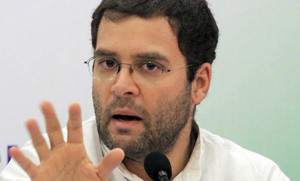 New Delhi, Jan 28: Congress vice president Rahul Gandhi Monday said that it is not his job to ensure that cases are lodged against the party ministers accused of corruption.
New Delhi, Jan 28: Congress vice president Rahul Gandhi Monday said that it is not his job to ensure that cases are lodged against the party ministers accused of corruption.
In an interview to Times Now, Gandhi acknowledged that there was no case being followed up against Himachal Pradesh Chief Minister Virbhadra Singh over alleged corruption, and said: "It is not my job. My job is when I see issues of corruption, take action on it. That's what I do".
"As far as any corruption done, there is a legal process. And that legal process should be followed and concluded. As far as my personal view is concerned, anybody who is corrupt should be brought to book," he said.
"I am not a judge. So, if there is a legal process and there is a result of the legal process, absolutely they should be punished."
Gandhi said that Virbhadra Singh and former Maharashtra chief minister Ashok Chavan, accused in the Adarsh Society scam, were not "oblivious" because of their "clout."
Asked that he had not spoken during controversies relating to the "the CWG scam and railgate", Gandhi said he had conversations with the prime minister.
"Whatever I felt I had conversations with the prime minister. Whatever I felt about the issues I made it abundantly clear to the prime minister."
Answering queries, he said Congress had taken action wherever there had been issues of corruption.
"We are the ones who brought the RTI which is the single biggest weapon against corruption. And we got it ourselves. We are the ones who delivered RTI to this country," Gandhi said.
"What I will say is that in the Congress party anybody who does any act of corruption will be taken up and punished," Gandhi said. He also called for passage of pending six anti-corruption bills in parliament.
"What all I'm saying is that anybody, regardless of who he is, if there is any corruption by any Congress person we will take action."
Answering questions about Pawan Kumar Bansal and Ashwini Kumar, who had to resign from their cabinet posts, Gandhi said the country needs to look at the fundamental issues at hand.
"We absolutely have to change the way our political system is structured, we have to change our political parties, we have to make them more transparent, we have to change the processes that we use to elect candidates, we have to empower women in the political parties, that is where the meat of the issue but I don't hear that discussion," Gandhi said.





Comments
Add new comment